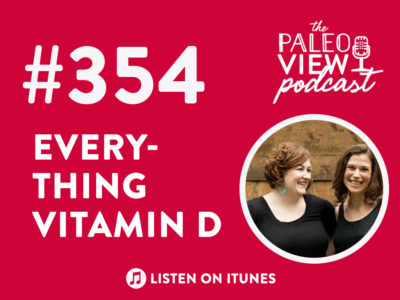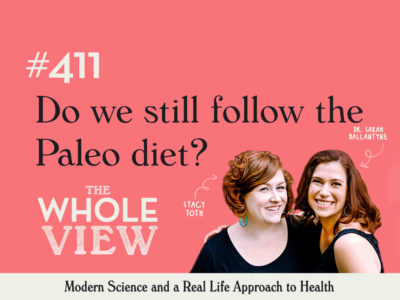On this episode, Sarah and Stacy talk all things vitamin D. What all is vitamin D responsible for in the body, how do we get adequate levels of this super nutrient, and perhaps most importantly, how do we test our vitamin D levels and get our ranges within optimal levels. All of this and more on episode 354!
If you enjoy the show, please review it on iTunes!
The Paleo View (TPV), Episode 354: Everything Vitamin D
-
-
(0:41) Welcome
- Welcome back, listeners!
- Stacy had an emergency room visit over the weekend
- The doctor said it was all good news because they couldn’t find anything wrong with Stacy
- Shortly after Stacy then came down with a stomach bug
- She is feeling a bit better now
- Stacy is excited to discuss vitamin D on this week’s episode because it ties in very well with the start of summer and some of the health issues she has been dealing with as of late
- This is the first episode sponsored by EverlyWell and Stacy wants to take a moment to welcome and thank them for their support
- Stacy and Sarah will be sharing more about EverlyWell within this episode, but to check them out and receive 15% off your order, visit this link and enter ‘ThePaleoView’ at checkout
- Sarah loves EverlyWell because they search for the labs that have the best quality of each kind of test and then they facilitate the tests through the best labs and then get the results to you very quickly
- They offer blood spot, salvia, and urine tests
- They take data very seriously and keep everything confidential
- Everything is processed through certified labs
- It is cheaper for Sarah to go through EverlyWell for her vitamin D test than it is to go through her medical provider because of the copay fee associated with her primary doctor
- A lot of these tests are often not available through conventional doctors
- Sarah wants to note to be careful to not self diagnose based on the lab results; to instead take the results to a doctor so they can provide an official medical opinion
- Be sure to refer to this podcast episode for more information on how to select a doctor when determining who best to work with when reviewing your lab results
-
(7:31) Why is Vitamin D so important?
- It is estimated that as much as 75% of people living in Western countries are deficient in vitamin D
- This is because we grow our food indoors, our diet is deficient in vitamin D, and we spend less time outside
- It is incredibly challenging to get vitamin D from our diet
- We are not spending enough time outside to make our own vitamin D
- There are also a lot of things that can interfere with vitamin D synthesis (ex: if you are inflamed, if you are overweight, fructose consumption)
- Vitamin D deficiency is rampant, and not just in those who consume a SAD, but also in the Paleo community
- Once you are deficient in vitamin D there is no amount of sunbathing or fresh seafood eating that will help you restore those levels
- You will have to supplement once deficient
- Sarah doesn’t typically support supplementation unless for targeted reasons after testing and under the supervision of a healthcare provider
- She far prefers that we get all of the nutrients that our body needs from food
- Vitamin D is really different from other nutrients though
- Stacy and Sarah discussed how very important it is to not let this topic overwhelm you but to take note that this is an important area to address in your overall health and well-being work
- Vitamin D is not just a vitamin, it is a hormone
- This is a steroid hormone like cortisol, testosterone, estrogen
- It has a cholesterol backbone
- We get a little bit from our diet, but most of it is synthesized by our skin cells from cholesterol using UVB energy from the sun to drive that formation
- We need UV radiation from the sun for this particular vitamin synthesis
- A lot of other vitamins are often used as cofactors, they are used to help facilitate some type of chemical reaction
- But vitamin D actually causes communication between different systems in the body
- It can turn on or off more than 200 different genes
- Diverse functions:
- mineral metabolism
- bone mineralization and growth
- biosynthesis of neurotrophic factors
- hormone regulation
- cell survival and division
- circadian rhythms
- immune system
- regulates the formation of antioxidants
- modulates the activity of macrophages and dendritic cells
- controls subpopulations of T cells (decreases Th1 cells)
- modulates the activity of T cells and B cells
- regulatory T cell function is dependent on vitamin D
- gut health
- protects mucosal barrier homeostasis
- deficiency exaggerates intestinal permeability caused by infection
- deficiency leads to shifting toward pathogenic bacteria (Helicobacter, Veillonella, and Erysipelotrichaceae)
- supplementation restores levels of probiotic bacteria (Lactococcus, Akkermansia)
- supplementation increases microbial diversity
- Pretty much every important function of the immune system is regulated by vitamin D
- Vitamin D deficiency essentially causes increased susceptibility to infection, that’s why it is linked with cancer, cardiovascular disease, diabetes, obesity, autoimmune disease, kidney diseases, osteoporosis, and all other chronic illnesses
- Sarah has been digging into the research on vitamin D and gut health
- It has been known for a very long time that vitamin D is responsible for regulating the integrity of barrier tissues within the body
- Vitamin D deficiency causes increased intestinal permeability, which causes leaky gut and exaggerates how leaky our gut gets in response to an infection
- What is really interesting to Sarah is that fairly new research is showing that the composition of our gut microbiome is sensitive to our vitamin D status
- So it is a new idea that our gut microbiome is shaped by our hormones
- Vitamin D deficiency by itself causes gut dysbiosis and there are a number of studies that show that vitamin D supplementation can restore levels of probiotic bacteria
- There is also evidence that supplementing can dramatically increase microbial diversity
- Vitamin D is basically a linchpin – if we get this one thing dialed in, we can essentially get all these other things to fall into place
- This is a super hormone, where vitamin D’s roles are so diverse that if you can get vitamin D dialed in, it will make all the other pieces fall into place
- Getting enough vitamin D naturally is a huge challenge for most of us
- Vitamin D impacts other linchpins
- This is why Sarah feels that testing vitamin D levels is something that we should all do
- It is estimated that as much as 75% of people living in Western countries are deficient in vitamin D
-
(27:08) Where do we get vitamin D from?
- How much vitamin D we produce in response to sun exposure depends on a lot of factors
- Latitude of your location
- Time of year
- Cloud coverage
- Time of day outside
- How much of your skin is exposed
- In ideal conditions, and with your internal health at optimal levels, you will synthesize adequate levels of vitamin D in seven minutes of sunbathing
- If you live farther north, it would take somewhere between thirty minutes and an hour and a half of sun exposure every single day, in the middle of the day, in the summer on a sunny day, to get enough vitamin D
- The time extends based on how much you are covered up
- The older you are, the less efficient your vitamin D synthesis is
- The more tan you are or the more naturally dark skin you are the less efficient you are at making vitamin D – so you need to spend even more time outside to make the same amount of vitamin D
- Even indoors there aren’t UV wavelengths that we are getting exposed to even if we are sitting near a window or sitting in our car
- Given that we are spending more time indoors than ever before in human history and that there aren’t even small amounts of UV radiation getting indoors that would have years ago, this is the biggest reason why we are so vitamin D deficient as a society
- Vitamin D is measured in IU (international units) and about 40 IUs is equivalent to one microgram
- Wild fish is the highest vitamin D food and pasture raised meat is second
- A serving size would have between 600 and 1,000 IUs of vitamin D
- A therapeutic dose of vitamin D from a supplement typically has between 5,000 and 50,000 IUs of vitamin D
- While vitamin D deficiency is rampant, it is not just a question of supplementing blindly because you don’t want to overshoot the mark
- The functional medicine defined optimal range of vitamin D is between 50 and 70 nanograms per milliliter
- Sarah tries to keep her levels in that middle range, around 60
- There is some research showing that between 70 and 100 nanograms per milliliter may have some therapeutic benefit in cancer and heart disease
- If you wanted to shoot for these kinds of levels, it would be situation dependent and only ever under medical supervision
- There is nothing in the human body where more is better
- Too much vitamin D is associated with brittle bones, too high of calcium levels, and a variety of GI issues (like nausea, vomiting, poor appetite, abdominal pain, constipation, diarrhea)
- Elevated calcium levels can be a strain on the heart and the kidneys
- This is why retesting is so important
- Sarah recommends testing every three months to see how the changes you are making are impacting your numbers and to see what is placing you in the Goldilocks range
- Vitamin D is a slow mover – the vitamin D cycle in our body is about 2 months, so it takes a while to alter these levels within our body
- Continue to keep an eye on vitamin D levels and continue to adjust vitamin D supplementation as you are working on the lifestyle things to try to find that happy medium where you have a lifestyle that is sustainable and you are keeping your vitamin D levels in range
- How much vitamin D we produce in response to sun exposure depends on a lot of factors
-
(47:50) Closing Thoughts
- Stacy now understands why Sarah is encouraging Stacy to use EverlyWell to test her vitamin D levels
- Stacy ordered the vitamin D and inflammation test
- However, there is just a vitamin D test available on their site as well
- Sarah is very impressed with what EverlyWell is doing and even had the chance to talk with their Medical Director about what they are doing for quality control and their model
- They are really about empowering the population to make testing accessible and affordable
- EverlyWell offers such a huge variety of tests to help you dig deeper to troubleshoot and find the underlying factors that are holding our body back from responding to all of our good healthy choices
- Their mission and where this company’s heart is at is so amazing
- So, if you are wanting to test your Vitamin D levels, be sure to visit: https://everlywell.com/thepaleoview
- Enter the code ‘ThePaleoView’ at checkout to receive 15% off your order
- A huge thank you to EverlyWell for sponsoring this show and for all the great work you are doing
- Thank you, listeners, for tuning in – we will be back again next week!
- Stacy’s family is preparing to leave for their cross country road trip, so Sarah and Stacy will be a doing a little time warp in the next couple of weeks
- Stacy now understands why Sarah is encouraging Stacy to use EverlyWell to test her vitamin D levels
-










